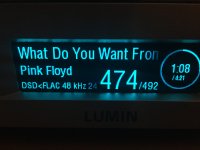You are using an out of date browser. It may not display this or other websites correctly.
You should upgrade or use an alternative browser.
You should upgrade or use an alternative browser.
Teaser
- Thread starter wklie
- Start date
CPP
Active member
Hi Wilco
Currently i am by incidence streaming PinkFloyd ( from Master on Tidal HiFi ) on my Lumin T1
and it says 48 / 24

Thats what I'm getting 48/24
- Thread Author
- #25
The Masters albums are presently playing at 44.1 kHz/ 24 bit on the Lumin. I think they will ultimately, according to Tidal, be at 96/24
Tidal Master albums are delivered in both 24/44.1 and 24/48 MQA formats (for non supported devices they'll be delivered at 16/44.1 non-MQA only). They will be partially decoded by Tidal desktop app to become 24/88.2 and 24/96 respectively. They will be fully decoded by certified MQA playback devices to multiple of 44.1 or 48 rates respectively.
Tidal MQA are delivered in both 24/44.1 and 24/48 formats (for non supported devices they'll be delivered at 16/44.1 only). They will be partially decoded by Tidal desktop app to become 24/88.2 and 24/96 respectively. They will be fully decoded by certified MQA playback devices to multiple of 44.1 or 48 rates respectively.
Does this include the D1? If so, what are the base settings for "options" that need to be set to realize any best-MQA listening at this time?
All Lumin players / transport currently receives the 24-bit Tidal MQA and will play them undecoded.
From the Tidal web GUI only, (and plumbed from computer to Lumin via USB) correct?
- Thread Author
- #29
From the Tidal web GUI only, (and plumbed from computer to Lumin via USB) correct?
Lumin network players / transport are not USB DAC, so it's not possible to connect a computer (source) to Lumin (destination) via USB.
Tidal playback using Lumin is done natively, without requiring any computer, Tidal native app or web. This is done using the Lumin app, or other OpenHome apps such as Linn Kazoo or Bubble DS Next.
A minimal Lumin setup that plays Tidal (instead of local files) just requires a LAN connection from a Lumin to the WiFi router, and an iPad. No computer is required.
(P.S. To get a network player that operates like Lumin but also with USB DAC input, there is Esoteric N-05.)
Milk_vanilla
New member
can't wait
:woot:
:woot:
- Thread Author
- #32
You are correct I forgot my D1 is not a DAC. Are you saying that the D1 fed from the lumin app on iphone or iPad (right now) will have MQA compatibility using the Tidal masters during streaming?
D1, along with other Lumin players, currently receive 24-bit MQA in 24/44.1 or 24/48 format and will play them without any MQA unfolding/decoding.
D1, along with other Lumin players, currently receive 24-bit MQA in 24/44.1 or 24/48 format and will play them without any MQA unfolding/decoding.
Ok, got it. Thanks Peter, much appreciated.
- Thread Author
- #34
Thanks Peter. Looking good!
Just a question. In the description of MQA on the Lumin website, it says, "LUMIN network music players can automatically perform Core Decoding and Hardware Rendering of MQA-encoded streams to get the maximum available Hi-Res music data (up to 24-bit 384kHz)."
So what we're getting is stage 1 and 2 of the MQA decode, but not the final stage 3, correct? Is this something being worked on? How do you see this third step happening without a board change and do you feel it's worth it?
- Thread Author
- #36
We're doing Full Decoding for "highest possible sound quality" as case D here:
http://www.computeraudiophile.com/content/748-mqa-civilians/
I've seen people mention stage 1, 2, 3 before - where do these terms originate from?
http://www.computeraudiophile.com/content/748-mqa-civilians/
I've seen people mention stage 1, 2, 3 before - where do these terms originate from?
We're doing Full Decoding for "highest possible sound quality" as case D here:
http://www.computeraudiophile.com/content/748-mqa-civilians/
I've seen people mention stage 1, 2, 3 before - where do these terms originate from?
http://www.audiostream.com/content/mqa-decoding-explained#R27ybvzlWDBHq8Sz.97
Lots of other information. The question is: is the only difference between stage 2 and stage 3 the difference between 24/96 and 24/192 or are there other filters, etc. applied?
soundqcar
Member
Most who have heard MQA in all its "glory", have taken note that the final "deblurring" stage is the key element to full enjoyment. As Mike is alluding to, is this capability even possible with just a software change/update?
Most who have heard MQA in all its "glory", have taken note that the final "deblurring" stage is the key element to full enjoyment. As Mike is alluding to, is this capability even possible with just a software change/update?
My understanding is that the final stage requires licensing, hardware change, etc.
We're doing Full Decoding for "highest possible sound quality" as case D here:
http://www.computeraudiophile.com/content/748-mqa-civilians/
I've seen people mention stage 1, 2, 3 before - where do these terms originate from?
So full decoding as stated in case D would mean MQA "in all its glory" right?
D. Hardware Full Decoding
Sent from my iPhone using Tapatalk

